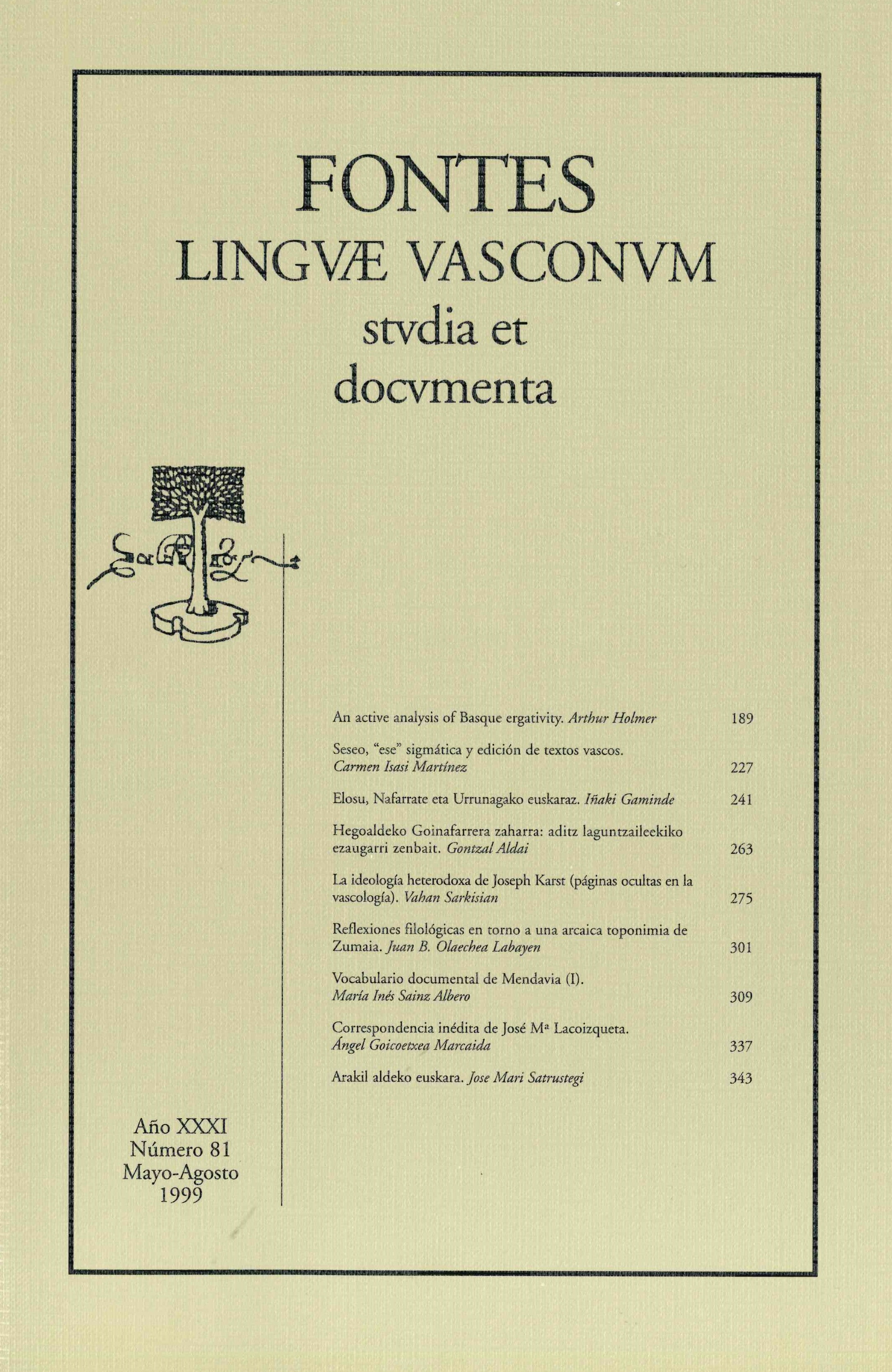An active analysis of Basque ergativity
Resumen
Los datos del euskera señalan que los dos casos vascos, NOR y NORK, tienen importantes diferencias con respecto al caso nominativo, que los trabajos anteriores no han explicado suficientemente. Ninguno de ellos es “un caso de sujeto” con el significado que solamente puede aparecer como sujeto: ni el caso NORK, como se ve en este ejemplo, Gerrak Euskal Herrian eragindako lehen biktima... donde el sustantivo en caso NORK tiene la función del adverbial “por la guerra”. Por eso digo que los dos casos del euskera corresponden a acusativo y ergativo. Es decir: NOR, acusativo; NORK, ergativo.
Esto no es tan económico, porque no hay ningún caso que corresponda a nominativo. Pero la comparación con otras lenguas, por ej., seediq en Taiwan y otros idiomas austroneses demuestra que este tipo de economía no es necesario. En los idiomas austroneses coexisten los tres casos, nominativo, ergativo y acusativo, así que hay evidencia de que acusativo y ergativo pueden coexistir.
Estadísticas
Referencias
ARTIAGOITIA, Xabier. 1995. Verbal projections in Basque and minimal structure. Supplements of Anuario del Seminario de Filología Vasca "Julio de Urquijo", XXXVI. Donostia: Gipuzkoako Foru Aldundia
BITTNER, Maria & Ken HALE. 1996. 'The structural determination of case and agreement.'Linguistic Inquiry 27.1, 1 - 68
BOBALJIK, Jonathan. 1993. 'On ergativity and ergative unergatives'. Papers on Case and Agreement II. MITWPL 19, 45 - 88
BURZIO, Luigi. 1986. Italian syntax. Dordrecht: Reidel https://doi.org/10.1007/978-94-009-4522-7
CHANG Yung-Li. 1997. Voice, case and agreement in Seediq and Kavalan. PhD thesis, National Tsinghua University, Taiwan.
CHOMSKY, Noam. 1981. Lectures on Government and Binding. Dordrecht: Foris
CHOMSKY, Noam. 1992. A minimalist program for linguistic theory. (MIT Occasional Papers in Linguistics, 1). MIT, Cambridge, MA
DIXON, R. M. W. 1979. 'Ergativity'. Language 55: 59-138 https://doi.org/10.2307/412519
DIXON, R. M. W. 1994. Ergativity. (Cambridge Studies in Linguistics 69). Cambridge: Cambridge University Press
EGUZKITZA, Andolin. 1993. 'Adnominals in the grammar of Basque'. In Hualde, José & Jon Ortiz de Urbina (eds). Generative studies in Basque linguistics. Amsterdam: John Benjamins. (p 163 - 187) https://doi.org/10.1075/cilt.105.07egu
GÓMEZ, Ricardo & Koldo SAINZ. 1995. 'On the origin of the finite forms of the Basque verb'. In Hualde, José, Joseba Lakarra and Robert Trask (eds). Towards a history of the Basque language. Amsterdam: John Benjamins. (p 235 - 274) https://doi.org/10.1075/cilt.131.10gom
GUILFOYLE, Eithne, Henrietta HUNG & Lisa TRAVIS. 1992. 'SPEC of IP and SPEC of VP: Two Subjects in Austronesian Languages'. Natural Language and Linguistic Theory 10.3: 375 -414 https://doi.org/10.1007/BF00133368
HAEGEMAN, Liliane. 1994. Introduction to Government and Binding theory: 2nd edition. Oxford: Blackwells
HARRIS, Alice. 1981. Georgian syntax. A study in relational grammar. Cambridge: Cambridge University Press
HEWITT, B. G. 1987. 'Georgian - ergative or active?'. In Dixon, R. M. W. (ed). Studies in ergativity. (Special issue of Lingua). (p 319 - 340) https://doi.org/10.1016/0024-3841(87)90077-5
HOLMER, Arthur. 1996. A parametric grammar of Seediq. (Travaux de l'institut de linguistique de Lund 30). Lund University Press
HOLMER, Arthur. 1997. 'Structural implications of the function of Instrument Focus in Seediq'. Paper presented at the Eighth International Conference on Austronesian Linguistics, Taipei, Taiwan
HOLMER, Arthur. (forthcoming). 'On complements of unaccusatives and the argument structure of motion verbs'. To appear in Working Papers 47 (1998), Dept of Linguistics, Lund University
HUALDE, José. 1988. 'Case assignment in Basque'. Anuario del seminario de filología "Julio de Urquijo" XXII-1 (1988) 313 - 330
LAKA, Itziar & Juan URIAGEREKA. 1987. 'Barriers for Basque and viceversa'. Proceedings of NELS 17: 394 - 428
LAKA, Itziar. 1995. A brief grammar of Euskara, the Basque language. http://www.ehu.es/grammar/index.htm
LAKA, Itziar. 1993a. 'Unergatives that assign ergative, unaccusatives that assign accusative'. In Papers on Case and Agreement I. MITWPL vol 18: 149 - 172
LAKA, Itziar. 1993b. 'The structure of inflection: a case study in X˚ syntax'. In Hualde, José & Jon Ortiz de Urbina (eds). Generative studies in Basque linguistics. Amsterdam: John Benjamins. (pp 21 - 70) https://doi.org/10.1075/cilt.105.02lak
LAKA, Itziar. 1994. On the syntax of negation. (Outstanding dissertations in linguistics). New York & London: Garland Publishing
LEVIN, Beth. 1983. On the nature of ergativity. PhD thesis. MIT
MANNING, Christopher. 1996. Ergativity. Argument structure and grammatical relations. (Dissertations in Linguistics). Stanford: CSLI
ORTIZ DE URBINA, Jon. 1989. Parameters in the grammar of Basque - a GB approach to Basque syntax. Dordrecht: Foris https://doi.org/10.1515/9783110876741
RAPOSO, Eduardo. 1987. 'Case theory and Infl-to-Comp: The inflected infinitive in European Portuguese'. Linguistic Inquiry 18,1:85-109
SALTARELLI, Mario. 1988. Basque. (Croom Helm descriptive grammar series). New York: Croom Helm
SIGUR SSON, Halldór Ármann. 1991. 'Icelandic Case-marked PRO and the licensing of lexical arguments'. NLLT 9:327-363 https://doi.org/10.1007/BF00134679
STAROSTA, Stanley. 1986. 'Focus as recentralisation'. In Geraghty, Paul, Lois Carrington & S.A. Wurm (eds). FOCAL I: papers from the Fourth International Conference on Austronesian Linguistics. (Pacific Linguistics, C-93), pp 73 - 95
TRASK, Robert. 1981. 'Basque verbal morphology'. Iker 1. 285 - 304. Bilbo: Euskaltzaindia.
Sources:
Espainako Gerra Zibila Euskal Herrian. [The Spanish Civil War in the Basque Country]. (a series of newspaper articles published in 1996 by Euskaldunon Egunkaria). http://www.geocities.com/CollegePark/5062/egzeh.html
IRIGOIEN, Joan Mari. 1989. Babilonia. Donostia: ELKAR
Derechos de autor 1999 Arthur Holmer

Esta obra está bajo licencia internacional Creative Commons Reconocimiento-NoComercial 4.0.







